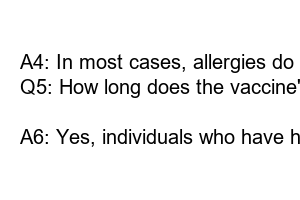독감 인플루엔자 무료 국가예방접종
Title: Free National Influenza Vaccination: Stay Healthy this Flu Season!
Intro:
As the flu season approaches, it’s essential to take proactive measures to protect yourself and your loved ones from the seasonal influenza virus. Amidst the challenging times we are currently experiencing, it’s comforting to know that the government is taking steps to ensure public health. In this blog post, we’ll explore the benefits of free national influenza vaccination and how it can help keep you healthy and resilient during flu season.
1. What is the National Influenza Vaccination Program?
The National Influenza Vaccination Program is an initiative by the government to provide free influenza vaccinations to the entire population. This program aims to reduce the spread of influenza and its severe effects on public health. By making the vaccine more accessible, the program encourages individuals from all walks of life to protect themselves against the flu.
2. How does the influenza vaccine work?
The influenza vaccine works by stimulating the body’s immune system to produce antibodies that defend against specific influenza strains. These strains are determined based on extensive research and surveillance data. By receiving the influenza vaccine, your body develops immunity, greatly reducing your chances of contracting and spreading the flu.
3. Who is eligible for free vaccination?
Under the free national influenza vaccination program, *all individuals above 6 months* are eligible for the vaccine. This means that everyone in your family can receive it and enjoy its protective benefits. It’s important to note that certain high-risk groups, such as pregnant women, young children, and the elderly, are strongly encouraged to get vaccinated due to their increased vulnerability to severe flu-related complications.
4. Where can you get the vaccine?
You can receive the free influenza vaccination at a range of accessible locations, including local clinics, hospitals, and designated vaccination centers. To find the nearest vaccination center, you can consult your healthcare provider, local health department, or even check credible online resources. Remember to bring your identification and any necessary medical documents to facilitate a smooth process.
5. Are there any side effects?
Like any vaccine, the influenza vaccine may have minor, short-lived side effects. These commonly include soreness, redness, or swelling at the injection site, mild fever, headache, and muscle aches. It is crucial to remember that the benefits of receiving the vaccine far outweigh the temporary discomforts associated with it.
6. When should you get vaccinated?
The optimal time to get vaccinated against the flu is *before the flu season begins*. However, receiving the vaccine at any time during the flu season can still provide substantial protection. It’s important to note that it takes about two weeks for the vaccine to reach its full effectiveness, so schedule your vaccination accordingly.
Summary:
Taking advantage of the free national influenza vaccination program is an integral part of safeguarding your health and the well-being of those around you. With its broad accessibility and proven effectiveness, the vaccine can significantly reduce the risk of contracting and spreading the flu. Remember, prevention is better than cure. So, get vaccinated, stay healthy, and contribute to building a stronger, flu-resistant community.
FAQs:
Q1: Can I contract the flu even after being vaccinated?
A1: While the vaccine greatly reduces your chances of getting the flu, it does not provide 100% immunity. However, if you do catch the flu after being vaccinated, the symptoms are often milder and the duration shorter.
Q2: How often should I get vaccinated?
A2: The flu vaccine is recommended annually since the influenza virus undergoes constant changes. Each year, new strains are identified, and the vaccine is updated to target these specific strains.
Q3: Is the vaccine safe for pregnant women?
A3: Yes, the influenza vaccine is considered safe for pregnant women and helps protect both the mother and the developing baby. Pregnant women are part of the high-risk group, making vaccination especially important for them.
Q4: Can I get vaccinated if I have allergies?
A4: In most cases, allergies do not prevent individuals from receiving the flu vaccine. However, it’s essential to disclose any allergies to your healthcare provider before getting vaccinated.
Q5: How long does the vaccine’s protection last?
A5: The influenza vaccine’s protection lasts for the duration of one flu season. Therefore, it is crucial to get vaccinated annually, ideally before the start of the flu season.
Q6: Can I receive the flu vaccine if I already had COVID-19 or have been vaccinated against COVID-19?
A6: Yes, individuals who have had COVID-19 or received the COVID-19 vaccine can still receive the flu vaccine. However, it’s advisable to wait for any acute symptoms or side effects to subside before getting vaccinated against the flu.

